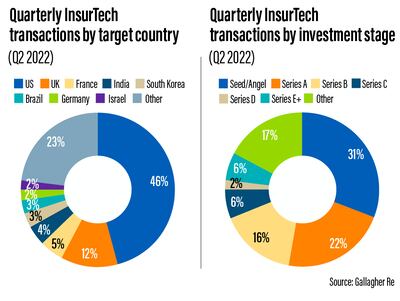Wefox, an insurance technology company backed by Abu Dhabi's Mubadala Investment Company, aims to double its revenue to €1.2 billion ($1.25 billion) in 2023 as it pushes its technology to more brokers, its chief executive said.
The Berlin-based company, which sells insurance products through in-house and external brokers, seeks to address what it sees as a gap in the $5 trillion global insurance industry, Julian Teicke told The National at Abu Dhabi Finance Week.
Wefox, which was founded in 2015, currently works with 150 insurers and about 3,000 distribution partners, managing more than two million customers.
The use of flexible technology to cater to each market's needs is an advantage InsurTech companies have against industry incumbents. This is a major part in wefox's plan to become not just a dominant player in the InsurTech space but in the entire insurance market, Mr Teicke said.
"There’s a lot of risk that should and could be insured but currently is not, due to complexity and a lack of awareness among consumers. Technology makes the process a lot simpler," he said.
"It would close the protection gap and make it easy for consumers to access insurance; instead of directly going to consumers, we go to brokers to whom we give our technology to connect to their customers through digital means."
The demand for InsurTech solutions is rising as it helps predict consumer demand, increase purchasing quantities, as well as enhance decision-making and insurance planning through the use of machine learning, artificial intelligence and cloud computing. Consumers benefit from a more efficient insurance model because pricing is more competitive.
The global InsurTech industry is expected to hit $165.4 billion by 2032, from about $16.6 billion in 2022, at a compound annual growth rate of about 26 per cent, according to Future Market Insights.
Spending for IT and technology services in the overall insurance sector is projected at about $255 billion in 2022, according to Capgemini and the European Financial Management Association.

Investment in InsurTech companies, meanwhile, continues to grow, with the sector raising $15.8 billion in funding in 2021, a record high, from 564 deals, as more capital flowed into the industry last year than in 2020 and 2019 combined, Gallagher Re said in a previous report.
Wefox received a $400 million investment from a Mubadala-led Series D funding round in July, which raised the company's valuation to about $4.5 billion, further cementing its status as a unicorn, or a start-up that has a market value of more than $1 billion.
founder and chief executive of wefox
While in general the insurance market is on an upward trajectory, Mr Teicke acknowledged that tightening of the economy does affect some of the sector's business lines, prompting them to be cautious with their approach.
For instance, life insurance is highly dependent on interest rates, with that segment struggling over the past years when interest rates were low.
"Now, with increasing interests, that business is becoming interesting again. However, we are not getting into these businesses that are so reliant on the economic situation or environment," Mr Teicke said.


